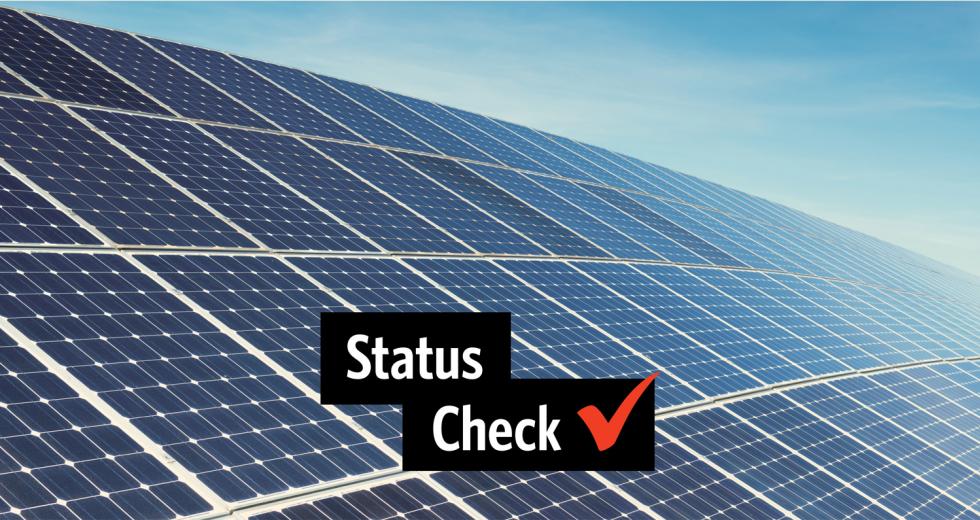In September 2018, a Davis-based Community Choice Aggregation option known as Valley Clean Energy offered to extend its service to Winters and West Sacramento, months after launching in Woodland, Davis and unincorporated Yolo County.
A month later, Comstock’s published a story about CCAs and their impact on the energy market and their potential long-term viability. CCAs offer an alternative to investor-owned energy giants like Pacific Gas & Electric in areas that public utilities like the Sacramento Municipal Utility District don’t extend to, such as Yolo County (“Power Politics,” by Steven Yoder, October 2018). First launched in 2010, these publicly run ventures can also deliver cheaper energy to ratepayers and provide higher percentages of clean energy to meet upcoming state mandates.
At the time of our reporting, a big question hadn’t yet been answered: How would an expected change to the exit fee charged to customers who leave their investor-owned utility impact the future of CCAs, such as Valley Clean Energy?
Related: Power Politics
For several years, investor-owned utilities including PG&E had been requesting that the California Public Utilities Commission reconsider its Power Charge Indifference Adjustment, which is a fee CCA customers are required to pay to ensure remaining utility customers aren’t financially affected by their departure from an investor-owned utility. The fee shows up on a CCA customer’s monthly bill.
“The [PCIA] ensures that the customers who remain with the utility do not end up taking on the long-term financial obligations the utility incurred on behalf of now-departed customers,” according to a news release from the PCUC in June 2017, when it announced it would reevaluate this fee. “Examples of such financial obligations include utility expenditures to build power plants and, more commonly, long-term power purchase contracts with independent power producers.”
While traditional utilities have argued that this cost-sharing is needed to cover operational expenses, proponents of CCAs say the exit fee is actually a penalty and deters customers from switching to these new energy options. Last Oct. 11, the CPUC voted 5-0 to increase the exit fee, acknowledging at the time that former PG&E customers would pay 1.68 percent more than they did in 2018.
“I support the creation of alternative electric providers to expand customer choice, and our legal obligation is to make sure this happens without increased costs to customers who do not, or cannot, join a CCA,” Commissioner Carla J. Peterman said in a written statement at the time. “Today’s proposal ensures a more level playing field between customers.”
Jim Parks, director of marketing and customer care for Valley Clean Energy, says the CPUC’s decision to increase exit fees “was about a $3.5 million hit on our budget,” which caused his company to make its rates equal to PG&E.
On Oct. 16, just days after the CPUC decision, Valley Clean Energy went ahead with its goal of extending its service to Winters, and presented an informational proposal to Winters City Council. The council directed city staff to look into CCAs further, though City Manager John W. Donlevy says it might take until summer to do this. The reason: The analysis would cost $25,000 to perform, and Donlevy would prefer to see how this fiscal year goes. “Quite honestly, things are very tight for us,” he says. “We don’t have the $25,000 right now.”
Valley Clean Energy has not yet presented to West Sacramento, according to city spokesman Paul Hosley. “But will be looking at it, along with others opportunities, with the goal of making energy costs more competitive for our residents and businesses,” he says.
Parks says the CPUC’s decision has “slowed things down a bit. It’s not like it just stopped everything cold. But it made, I think, Winters kind of step back and go, ‘OK, we’re going to have to take a look and see how Valley Clean Energy and other community choice aggregators are impacted by these exit fees.’”
And once again that question remains unresolved. Last November, the CalCCA trade association filed paperwork requesting a rehearing for the CPUC to revisit its decision on the exit fee adjustment. Meanwhile, PG&E faces some of the greatest uncertainty in its history, having filed for bankruptcy in the wake of the Camp Fire in Northern California November, with tens of billions of dollars in potential legal liability.
Parks remains hopeful of eventually doing business with Winters and West Sacramento. “The way I would term it is that we’re kind of on hold right now,” Parks says. “But I believe the conversations will begin again before too long, which could be a year or two.”



